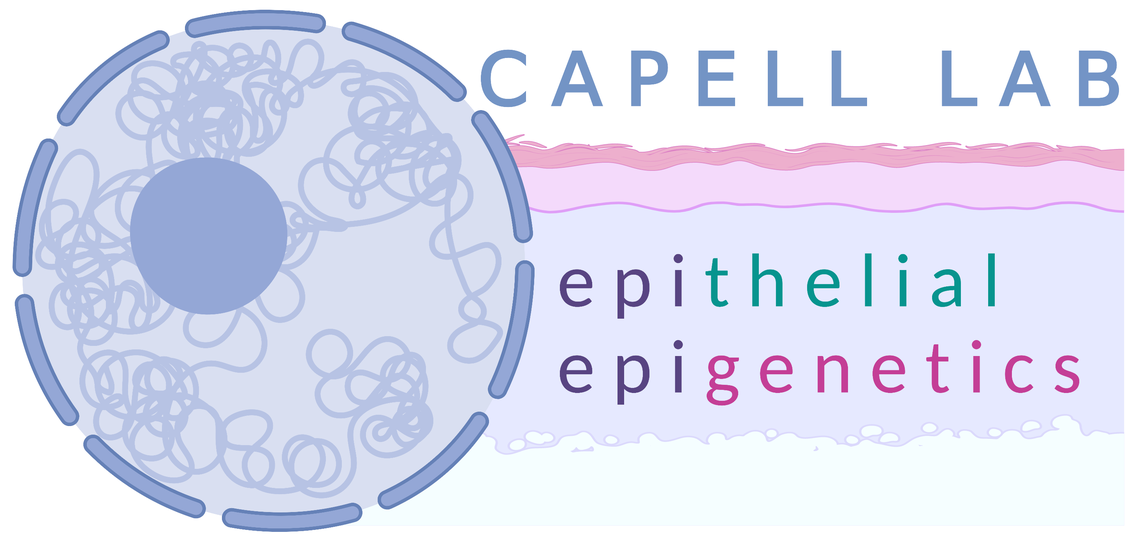EPITHELIAL EPIGENETICS

Epithelial tissues rely on a highly coordinated balance between self-renewal, proliferation, and differentiation. Epigenetic mechanisms provide this precise control through the regulation of gene expression in order to establish and maintain cell fate and identity. Disruption of these pathways can disrupt diverse cellular processes including both metabolism and immunity, and ultimately drive conditions ranging from aging and cancer to inflammatory disease.
For example, there is an exceptionally high incidence of mutations in epigenetic modifiers in cancers of self-renewing epithelial tissues such as squamous cell carcinoma (SCC). SCC is the most common type of cancer worldwide, affecting numerous epithelial tissues ranging from the skin and eyes to the lung, esophagus, and oropharynx. Despite this, precisely how disruption of epigenetic homeostasis may drive epithelial cancers such as SCC is poorly understood.
In the Capell Lab, we combine cutting-edge technologies, human patient samples, primary cells, and mouse models in order to investigate major questions at the intersection of epigenetics, epithelial biology, cancer, immunity and metabolism:
EPITHELIAL-IMMUNE INTERPLAY
As the primary barrier to the external environment, epithelial surface tissues like the skin are constantly exposed to a variety of external insults ranging from UV radiation to infection. The epigenome serves as a vital mediator and integrator of these environmental signals, allowing cells to not only respond, but to also form memories of these exposures. In responding to environmental exposures, epithelial cells can also communicate and interface with the local immune and tissue microenvironment. In the Capell Lab, we are interested in not only uncovering these underlying mechanisms, but learning how we can harness the inherent reversibility and targetability of the epigenome in order to prevent and treat common conditions like skin cancer, as well as enhance responses to existing therapies.
DIET, LIPID METABOLISM, AND FERROPTOSIS
Emerging evidence has demonstrated that alterations in lipid metabolism, including those affected by diet, can directly influence oncogenic signaling, programmed cell death pathways, and antitumor immunity. Our lab identified that a major epigenetic tumor suppressor regulates key lipid metabolism genes involved in a form of programmed cell death known as “ferroptosis”, and that ferroptosis may be critical for epithelial differentiation and tumor suppression in SCC. Given the potential to modulate ferroptosis via both small molecules and diet, this provides a great opportunity for therapeutic discovery.
SEX CHROMOSOME COMPLEMENT AND ITS ROLE IN SEX BIAS IN DISEASE
One of the biggest questions in medical research today regards what are the mechanisms that explain sex differences in disease incidence and mortality. Across autoimmune, infectious, and neoplastic disease, sex bias drives significant differences in gene expression as well as disease incidence and outcomes between men and women. While there is evidence for the earlier initiation and worse outcomes in skin cancer among males, approximately 80% of autoimmune disease occurs in females. Despite this, the mechanisms that govern these observed sex disparities have been historically understudied. We hypothesize that a key contributor to sex disparities in epithelial disease is sex chromosome complement, which can lead to gene dosage disparities. In particularly, several epigenetic enzymes exist on either the X or the Y chromosome, and have been implicated in disease pathogenesis in a wide variety of contexts. However, as their roles in skin biology and disease are poorly understood, we are actively investigating these open questions.
If you would be interested in joining our team, please contact us!

